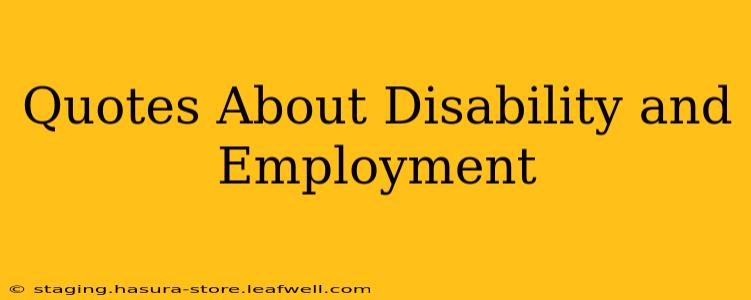The world of work is transforming, embracing a more inclusive vision where talent and potential are valued above all else. This shift is particularly impactful for individuals with disabilities, who deserve equal opportunities to contribute their skills and experience. This article explores powerful quotes about disability and employment, offering insights into the challenges, triumphs, and ongoing fight for workplace inclusion. We'll also address frequently asked questions surrounding disability employment.
What are some inspiring quotes about disability and employment?
Many inspiring figures have eloquently voiced the importance of inclusive employment practices. Here are a few powerful quotes that encapsulate the spirit of empowerment and opportunity:
-
"The only disability in life is a bad attitude." – Scott Hamilton: This quote highlights the importance of mindset and resilience. It emphasizes that perceived limitations are often self-imposed, and a positive attitude can overcome many obstacles. While physical or mental challenges may exist, a positive perspective is crucial for success in the workplace.
-
"We must ensure that the workplace reflects the diversity of our communities. Inclusion is not just morally right, it's economically smart." – Unknown: This quote emphasizes the business case for inclusion. Diversity brings different perspectives, experiences, and problem-solving skills, leading to innovation and improved company performance. Ignoring the talent pool of individuals with disabilities is a missed economic opportunity.
-
"Talent is distributed equally across the human population; opportunity is not." – Unknown: This powerful statement speaks to the systemic barriers individuals with disabilities face in accessing employment. While everyone possesses talent, societal structures often create unequal access to opportunities. Addressing these systemic barriers is crucial for true inclusivity.
What are the common challenges faced by people with disabilities in finding employment?
Navigating the job market can be challenging for anyone, but individuals with disabilities often face unique hurdles. These include:
-
Accessibility Barriers: Lack of accessible workplaces, technology, and transportation can prevent individuals from applying for or performing jobs. This includes physical barriers like inaccessible buildings, as well as technological barriers like websites and software that aren’t compatible with assistive technology.
-
Prejudice and Discrimination: Sadly, negative attitudes and biases continue to exist, leading to discrimination in hiring and promotion processes. Employers may hold unfounded assumptions about the abilities of individuals with disabilities, overlooking their talent and skills.
-
Lack of Awareness and Understanding: A lack of awareness among employers and hiring managers about the capabilities of individuals with disabilities can lead to missed opportunities for both the employee and the company. Education and training are needed to change perceptions and promote understanding.
-
Limited Job Opportunities: There may be fewer job opportunities specifically designed to accommodate the needs of individuals with disabilities. This can limit their choices and career paths.
How can employers create a more inclusive workplace for people with disabilities?
Creating an inclusive workplace involves proactive steps to remove barriers and foster an environment where everyone can thrive. This includes:
-
Accessible Recruitment Processes: Using accessible application methods, offering alternative interview formats, and providing reasonable accommodations throughout the hiring process.
-
Workplace Accessibility Modifications: Making physical adjustments to the workplace, providing assistive technologies, and adapting job tasks to accommodate individual needs.
-
Diversity and Inclusion Training: Educating employees about disability awareness, challenging stereotypes, and promoting respectful interactions.
-
Mentorship and Support Programs: Providing mentorship opportunities and support systems to help employees with disabilities succeed in their roles.
-
Flexible Work Arrangements: Offering options such as flexible hours, telecommuting, and compressed workweeks to improve work-life balance and accommodate individual needs.
What resources are available to help people with disabilities find employment?
Numerous resources are available to assist individuals with disabilities in their job search:
-
Government Agencies: Many countries have government agencies dedicated to supporting employment for people with disabilities. These agencies often provide job placement services, training programs, and financial assistance.
-
Non-profit Organizations: Numerous non-profit organizations specialize in assisting individuals with disabilities in finding and maintaining employment. These organizations often offer job training, career counseling, and advocacy services.
Conclusion: Celebrating Abilities, Not Limitations
The quotes highlighted above underscore the importance of embracing diversity and inclusion in the workplace. Creating an environment that values the unique skills and contributions of individuals with disabilities is not just morally right; it's essential for a thriving and competitive economy. By challenging prejudices, providing necessary support, and embracing the wealth of talent available, we can build a more equitable and successful future for everyone.

